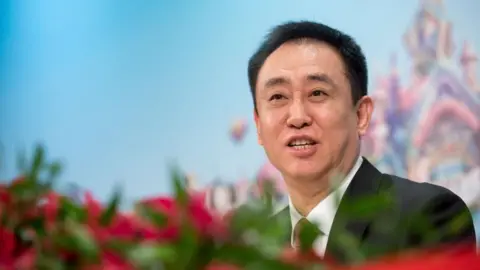Business
Evergrande: Chinese property giant delisted after spectacular fall

Business reporter, BBC News
 AFP via Getty Images
AFP via Getty ImagesChinese property giant Evergrande’s shares were taken off the Hong Kong stock market on Monday after more than a decade and a half of trading.
It marks a grim milestone for what was once China’s biggest real estate firm, with a stock market valuation of more than $50bn (£37.1bn). That was before its spectacular collapse under the weight of the huge debts that had powered its meteoric rise.
Experts say the delisting was both inevitable and final.
“Once delisted, there is no coming back,” says Dan Wang, China director at political risk consultancy Eurasia Group.
Evergrande is now best-known for its part in a crisis that has for years dragged on the world’s second-largest economy.
What happened to Evergrande?
Just a few years ago Evergrande Group was a shining example of China’s economic miracle.
Its founder and chairman Hui Ka Yan rose from humble beginnings in rural China to top the Forbes list of Asia’s wealthiest people in 2017.
His fortune has since plummeted from an estimated $45bn in 2017 to less than a billion, his fall from grace as extraordinary as his company’s.
In March 2024, Mr Hui was fined $6.5m and banned from China’s capital market for life for his company overstating its revenue by $78bn.
Liquidators are also exploring whether they can recover cash for creditors from Mr Hui’s personal property.
At the time of its collapse, Evergrande had some 1,300 projects under development in 280 cities across China.
The sprawling empire also included an electric carmaker and China’s most successful football team, Guangzhou FC, which was kicked out of the football league earlier this year after failing to pay off enough of its debts.
 AFP via Getty Images
AFP via Getty ImagesEvergrande was built on $300bn (£222bn) of borrowed money, earning it the unenviable title of the world’s most indebted property developer.
The rot set in after Beijing brought in new rules in 2020 to control the amount big developers could borrow.
The new measures led Evergrande to offer its properties at major discounts to ensure money was coming in to keep the business afloat.
Struggling to meet interest payments, the firm soon defaulted on some of its overseas debts.
After years of legal wrangling, the Hong Kong High Court ordered the company to be wound up in January 2024.
Evergrande’s shares had been under threat of delisting ever since because they were suspended from trading after the court order.
By that point the crisis engulfing the firm had wiped more than 99% from its stock market valuation.
The liquidation order came after the company was unable to offer a workable plan to shed billions of dollars of overseas liabilities.
Earlier this month, liquidators revealed that Evergrande’s debts currently stand at $45bn and that it had so far sold just $255m of assets. They also said they believe a complete overhaul of the business “will prove out of reach”.
The “delisting now is surely symbolic but it’s such a milestone,” Ms Wang says.
All that remains is which creditors are paid and how much they can get in the bankruptcy process, says Professor Shitong Qiao from Duke University.
The next liquidation hearing is due to take place in September.
How was China’s economy impacted?
China is facing a number of major problems, including US President Donald Trump’s tariffs, high local government debt, weak consumer spending, unemployment and an ageing population.
But experts say Evergrande’s collapse, along with the serious problems faced by other developers, has hit the country hardest.
“The property slump has been the biggest drag on the economy, and the ultimate reason why consumption is suppressed,” Ms Wang says.
 Getty Images
Getty ImagesThis is particularly problematic as the industry accounted for about a third of the Chinese economy and was a major source of income for local governments.
“I don’t think China has found a viable alternative to support its economy at a similar scale,” Professor Qiao says.
The property crisis has led to “massive layoffs” by heavily-indebted developers, Jackson Chan from financial markets research platform Bondsupermart says.
And many real estate industry employees that kept their jobs have seen big pay cuts, he adds.
The crisis is also having a major impact on many households as they tend to put their savings into property.
With housing prices dropping by at least 30%, many Chinese families have seen their savings fall in value, says Alicia Garcia-Herrero, chief economist for Asia Pacific at French bank Natixis.
This means they are less likely to spend and invest, she adds.
In response, Beijing has announced a raft of initiatives aimed at reviving the housing market, stimulating consumer spending and boosting the wider economy.
They range from measures to help new home owners and support the stock market to incentives to buy electric cars and household goods.
Despite the hundreds of billions of dollars Beijing has poured into the economy, China’s once-blistering growth has eased to “around 5%”.
While most Western countries would be more than happy with that, it’s slow for a country that saw growth of more than 10% a year as recently as 2010.
Is the property crisis over yet?
In short, probably not.
Even as Evergrande continues to grab headlines, several other Chinese property firms are still facing major challenges.
Earlier this month, China South City Holdings was handed a winding up order by Hong Kong’s High Court, making it the biggest developer to be forced into liquidation since Evergrande.
Meanwhile, rival real estate giant Country Garden is still trying to secure a deal with its creditors to write off more than $14bn of outstanding foreign debt.
After a series of postponements, its next High Court liquidation hearing in Hong Kong is due to take place in January 2026.
“The whole property sector has been in trouble. More Chinese property firms will collapse,” Professor Qiao says.
 AFP via Getty Images
AFP via Getty ImagesWhile the Chinese government has taken a number of measures to help shore up the property market and support the economy as a whole it has not swooped in to directly bail out developers.
Mr Chan says these initiatives seem to be having a positive impact on the property market: “We think the bottom [has been reached] and it should be in a slow recovery. However, we probably don’t expect the recovery to be very strong.”
Wall Street investment giant Goldman Sachs warned in June that property prices in China will continue to fall until 2027.
Ms Wang agrees, and estimates that China’s stricken property market will “hit the bottom” in around two years when demand finally catches up with supply.
But Ms Garcia-Herrero puts it in starker terms: “there is no real light at the end of the tunnel.”
Beijing has sent a “clear message on its intention of not bailing out the housing sector,” Ms Wang adds.
The Chinese government has been careful to avoid the kind of measures that could encourage further risky behaviour by an already heavily indebted industry.
And while in the boom times, the property market was a key driver of China’s economic growth, the ruling Communist Party’s priorities now lie elsewhere.
President Xi Jinping is more focussed on high-tech industries like renewable energy, electric cars and robotics.
As Ms Wang puts it, “China is in a deep transition to a new age of development.”
Business
John Swinney under fire over ‘smallest tax cut in history’ after Scottish Budget

John Swinney has been pressed over whether this week’s Scottish Budget gives some workers the “smallest tax cut in history” – with Tory leader Russell Findlay branding the reduction “miserly” and “insulting”.
The Scottish Conservative leader challenged the First Minister after Tuesday’s Holyrood Budget effectively cut taxes for lower earners, by increasing the threshold for the basic and intermediate bands of income tax.
But Mr Findlay said that would leave workers at most £31.75 a year better off – saying this amounts to a saving of just £61p a week
“That wouldn’t even buy you a bag of peanuts,” the Scottish Tory leader said.
“John Swinney’s Budget might even have broken a world record, because a Scottish Government tax adviser says it ‘maybe the smallest tax cut in history’.”
Raising the “miserly cut” at First Minister’s Questions in the Scottish Parliament, Mr Findlay demanded to know if the SNP leader believed his “insulting tax cut will actually help Scotland’s struggling households”.
The attack came as the Tory accused the SNP government of increasing taxes on higher earners, with its freeze on higher income tax thresholds, which will pull more Scots into these brackets.
This is needed to pay for the “SNP’s out of control, unaffordable benefits bill”, the Conservative added.
Mr Findlay said: “The Scottish Conservatives will not back and cannot back a Budget that does nothing to help Scotland’s workers and businesses.
“It hammers people with higher taxes to fund a bloated benefits system.”
Hitting out at Labour – whose leader Anas Sarwar has already declared they will not block the government’s Budget – Mr Findlay said: “It is absolutely mind-blowing that Labour and other so-called opposition parties will let this SNP boorach of a budget pass.
“Don’t the people of Scotland deserve lower taxes, fairer benefits and a government focused on economic growth?”
Mr Swinney said the Budget “delivers on the priorities of the people of Scotland” by “strengthening our National Health Service and supporting people and businesses with the challenges of the cost of living”.
He insisted income tax decisions in the Budget would mean that in 2026-27 “55% of Scottish taxpayers are now expected to pay less income tax than if they lived in England”.
The First Minister went on to say that showed “the people of Scotland have a Government that is on their side”.
Referring to polls putting his party on course to win the Holyrood elections in May, the SNP leader added that “all the current indications show the people of Scotland want to have this Government here for the long term”.
Benefits funding is “keeping children out of poverty”, he told MSPs, adding the Budget contained a “range of measures” that would build on existing support.
The First Minister said: “What that is a demonstration of is a Government that is on the side of the people of Scotland and I am proud of the measures we set out in the Budget on Tuesday.”
Meanwhile he said the Tories wanted to make tax cuts that would cost £1 billion, with “not a scrap of detail about how that would be delivered”.
With the weekly leaders’ question time clash coming less than 48 hours after the draft 2026-27 Budget was unveiled, the First Minister also faced questions from Scottish Labour’s Anas Sarwar, who insisted that the proposals “lacks ambition for Scotland”.
Pressing his SNP rival, the Scottish Labour leader said: “While he brags about his £6 a year tax cut for the lowest paid, one million Scots including nurses, teachers and police officers face being forced to pay more.
“Even his own tax adviser says this is a political stunt. So why does John Swinney believe that someone earning £33,500 has the broadest shoulders and therefore should pay more tax in Scotland?”
Mr Swinney, however, said that many public sector workers would be better off in Scotland.
He told the Scottish Labour leader: “A band six nurse at the bottom of the scale will take home an additional £1,994 after tax compared to the same band in England.
“A qualified teacher at the bottom of the band will take home £6,365 more after tax in Scotland than the equivalent in England. There are the facts for Mr Sarwar.”
Business
BP cautions over ‘weak’ oil trading and reveals up to £3.7bn in write-downs

BP has warned it expects to book up to five billion dollars (£3.7 billion) in write-downs across its gas and low-carbon energy division as it also said oil trading had been weak in its final quarter.
The oil giant joined FTSE 100 rival Shell, after it also last week cautioned over a weaker performance from trading, which comes amid a drop in the cost of crude.
BP said Brent crude prices averaged 63.73 dollars per barrel in the fourth quarter of last year compared with 69.13 dollars a barrel in the previous three months.
Oil prices have slumped in recent weeks, partly driven lower due to US President Donald Trump’s move to oust and detain Venezuela’s leader and lay claim to crude in the region, leading to fears of a supply glut.
In its update ahead of full-year results, BP also said it expects to book a four billion dollar (£3 billion) to five billion dollar (£3.7 billion) impairment in its so-called transition businesses, largely relating to its gas and low-carbon energy division.
But it said further progress had been made in slashing debts, with its net debt falling to between 22 billion and 23 billion dollars (£16.4 billion to £17.1 billion) at the end of 2025, down from 26.1 billion dollars (£19.4 billion) at the end of September.
It comes after the firm’s surprise move last month to appoint Woodside Energy boss Meg O’Neill as its new chief executive as Murray Auchincloss stepped down after less than two years in the role.
Ms O’Neill will start in the role on April 1, with Carol Howle, current executive vice president of supply, trading and shipping at BP, acting as chief executive on an interim basis until the new boss joins.
Ms O’Neill’s appointment has made history as she will become the first woman to run BP – and also the first to head up a top five global oil company – as well as being the first ever outsider to take on the post at BP.
Shares in BP fell 1% in morning trading on Wednesday after the latest update.
Business
Budget 2026: Kolkata realtors seek tax relief, revised affordable housing cap; eye demand revival – The Times of India

Real estate developers in Kolkata have urged the Centre to use the Union Budget to recalibrate housing policies to reflect rising land and construction costs, calling for higher tax benefits for homebuyers and a long-pending revision of the affordable housing definition to revive demand, especially in the mid-income segment, PTI reported.With the Budget set to be tabled on February 1, industry players said measures such as revisiting price caps for affordable homes, rationalising GST on under-construction properties and easing approval processes could significantly improve affordability and sales momentum.Sushil Mohta, president of CREDAI West Bengal and chairman of Merlin Group, said reforms must align with current market realities. “Revisiting the affordable housing definition, rationalising housing loan interest deductions and streamlining GST rates will significantly improve affordability and demand, especially for middle-income homebuyers,” he told PTI, adding that a policy push for rental housing and wider access to formal housing finance is crucial amid rapid urbanisation.Mahesh Agarwal, managing director of Purti Realty, said continued policy support through tax rationalisation and infrastructure spending remains critical. “A re-evaluation of affordable housing price limits in line with rising land and construction costs, along with adjustments to GST on under-construction property, will enhance affordability,” he said, stressing that simpler tax frameworks and incentives for first-time buyers would help stabilise the market and speed up project execution.Echoing similar concerns, Merlin Group MD Saket Mohta pointed to sharp increases in construction costs since the introduction of GST in 2017, underscoring the need for further rationalisation. He also called for raising the affordable housing price cap from Rs 45 lakh to around Rs 80–90 lakh and expanding unit size norms. “Mid-income housing will be the key demand driver going into 2026, and supportive tax and policy measures are essential to sustain growth,” he said.Eden Realty MD Arya Sumant said the Budget must strike a balance between fiscal discipline and growth-oriented reforms. “Higher home loan interest deductions for mid-income and first-time buyers, an updated affordable housing definition, GST rationalisation and faster approvals will improve project viability and speed-to-market,” he said, adding that sustained urban infrastructure investment would unlock demand across residential and commercial segments.Sahil Saharia, CEO of Bengal Shristi Infrastructure Development Ltd, said policy focus should shift towards large, integrated developments. “Support for mixed-use townships, rental housing and commercial hubs, along with faster clearances and digital single-window mechanisms, can help create self-sustained urban ecosystems and improve execution efficiency,” he said.Developers said clear and stable policy signals in the Budget could help restore homebuyer confidence, attract long-term capital and ensure sustainable growth for the real estate sector in eastern India.
-

 Politics1 week ago
Politics1 week agoUK says provided assistance in US-led tanker seizure
-

 Entertainment1 week ago
Entertainment1 week agoDoes new US food pyramid put too much steak on your plate?
-

 Entertainment1 week ago
Entertainment1 week agoWhy did Nick Reiner’s lawyer Alan Jackson withdraw from case?
-

 Business1 week ago
Business1 week agoTrump moves to ban home purchases by institutional investors
-

 Sports5 days ago
Sports5 days agoClock is ticking for Frank at Spurs, with dwindling evidence he deserves extra time
-

 Sports1 week ago
Sports1 week agoPGA of America CEO steps down after one year to take care of mother and mother-in-law
-

 Business1 week ago
Business1 week agoBulls dominate as KSE-100 breaks past 186,000 mark – SUCH TV
-

 Business1 week ago
Business1 week agoGold prices declined in the local market – SUCH TV







